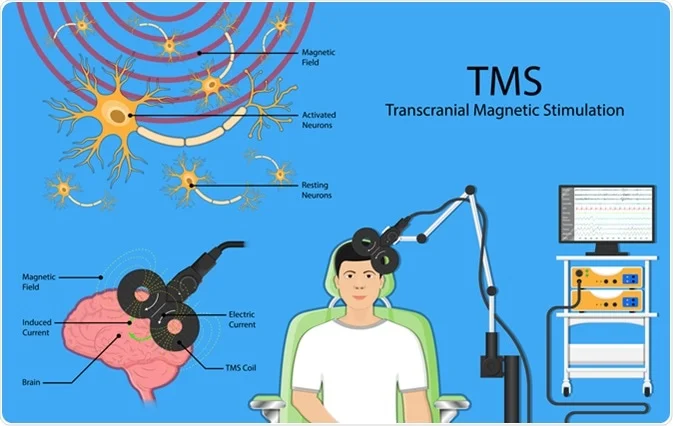WHAT IS TRANSCRANIAL MAGNETIC STIMULATION
Transcranial Magnetic Stimulation (TMS) is a non-invasive therapeutic technique that uses magnetic fields to stimulate nerve cells in the brain. It is primarily employed to treat various psychiatric and neurological disorders, most notably major depressive disorder, which is recognized by the World Health Organization as a leading cause of disability worldwide.
The process involves placing a coil on the scalp that generates brief magnetic pulses, inducing electrical currents in the underlying brain tissue. This stimulation can modulate cortical activity, enhancing or inhibiting neuronal excitability depending on the frequency of the pulses used.
Recent advancements in Transcranial Magnetic Stimulation (TMS) have significantly enhanced its application in mental health and neurological disorders. Here are some key developments:
SAINT Protocol
The Stanford Accelerated Intelligent Neuromodulation Therapy (SAINT) has emerged as a groundbreaking treatment, particularly for resistant depression. This protocol allows for faster and more substantial improvements in patients, often achieving significant results within days of treatment.
INDUSTRY-BASED TECH INNOVATIONS
New TMS devices have been introduced, featuring improved coil designs and advanced software for brain activity mapping. These innovations enhance the precision of treatments, making them more effective and comfortable for patients.
INTEGRATION OF AI
Artificial intelligence is now being utilized to develop personalized treatment plans based on individual patient needs, marking a significant shift towards tailored healthcare solutions[2].
NEURAL NAVIGATION SYSTEMS
These systems improve targeting accuracy during TMS sessions, allowing clinicians to stimulate specific brain regions more effectively, which is crucial for optimizing treatment outcomes.
BROADER APPLICATIONS
TMS is being explored for various neurological conditions beyond depression, including Parkinson’s disease, expanding its potential therapeutic reach.
Transcranial magnetic stimulation TMS. Image Credit: Rumruay / Shutterstock R By
As we conclude our exploration of recent advancements in transcranial magnetic stimulation (TMS), it is evident that this innovative therapy is reshaping the landscape of mental health treatment. The integration of advanced technologies, such as AI and improved neuroimaging techniques, has not only enhanced the precision of TMS applications but also expanded its potential to address a wider range of neurological and psychiatric disorders.
The emergence of protocols like the Stanford Accelerated Intelligent Neuromodulation Therapy (SAINT) signifies a monumental leap towards personalized treatment, offering hope for those with treatment-resistant conditions. Furthermore, the increasing accessibility of TMS through updated insurance policies and broader adoption by healthcare providers underscores a significant shift towards more inclusive mental health care.
Looking ahead, ongoing research and development will be crucial in refining TMS techniques and establishing standardized protocols. As we embrace these advancements, we move closer to a future where mental health treatment is not only more effective but also tailored to meet the unique needs of each patient. Stay tuned for more updates as this field continues to evolve!
Wanna learn more? dig in
Sources
[1] Advancements in Transcranial Magnetic Stimulation Research and ... https://www.ncbi.nlm.nih.gov/pmc/articles/PMC10460597/
[2] 2023's Biggest Advances in TMS - BrainHealth Solutions https://www.brainhealth-solutions.com/2023s-biggest-advances-in-tms/
[3] Advances in repetitive transcranial magnetic stimulation for ... https://www.sciencedirect.com/science/article/abs/pii/S0022395621002806
[4] Accelerated TMS - moving quickly into the future of depression treatment https://www.nature.com/articles/s41386-023-01599-z
[5] Advances in transcranial magnetic stimulation (TMS) and its ... - PubMed https://pubmed.ncbi.nlm.nih.gov/34990384/
[6] The Future Is Now? Rapid Advances by Brain Stimulation Innovation https://psychiatryonline.org/doi/10.1176/appi.ajp.2020.20060844
[7] Transcranial magnetic stimulation in clinical practice | BJPsych Advances https://www.cambridge.org/core/journals/bjpsych-advances/article/transcranial-magnetic-stimulation-in-clinical-practice/97900E1541D18163650553BB3CB02988
[8] Advances and Challenges in Transcranial Magnetic Stimulation ... https://www.sciencedirect.com/science/article/pii/B9780128130681000117

Comments